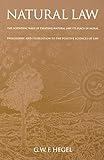Natural Law : The Scientific Ways of Treating Natural Law, Its Place in Moral Philosophy, and Its Relation to the Positive Sciences of Law / G. W. F. Hegel.
Material type: TextPublisher: Philadelphia : University of Pennsylvania Press, [2011]Copyright date: ©1976Description: 1 online resource (144 p.)Content type:
TextPublisher: Philadelphia : University of Pennsylvania Press, [2011]Copyright date: ©1976Description: 1 online resource (144 p.)Content type: - 9780812210835
- 9780812200256
- 171/.2
- K457.H43 A3813 1975eb
- online - DeGruyter
- Issued also in print.
| Item type | Current library | Call number | URL | Status | Notes | Barcode | |
|---|---|---|---|---|---|---|---|
 eBook
eBook
|
Biblioteca "Angelicum" Pont. Univ. S.Tommaso d'Aquino Nuvola online | online - DeGruyter (Browse shelf(Opens below)) | Online access | Not for loan (Accesso limitato) | Accesso per gli utenti autorizzati / Access for authorized users | (dgr)9780812200256 |
Browsing Biblioteca "Angelicum" Pont. Univ. S.Tommaso d'Aquino shelves, Shelving location: Nuvola online Close shelf browser (Hides shelf browser)

|

|

|

|

|

|

|
||
| online - DeGruyter Reading the Qur'ān in Latin Christendom, 1140-1560 / | online - DeGruyter Writing the Image After Roland Barthes / | online - DeGruyter Holy Wednesday : A Nahua Drama from Early Colonial Mexico / | online - DeGruyter Natural Law : The Scientific Ways of Treating Natural Law, Its Place in Moral Philosophy, and Its Relation to the Positive Sciences of Law / | online - DeGruyter From Virile Woman to WomanChrist : Studies in Medieval Religion and Literature / | online - DeGruyter Sick and Tired of Being Sick and Tired : Black Women's Health Activism in America, 1890-1950 / | online - DeGruyter Barbarian Tides : The Migration Age and the Later Roman Empire / |
Frontmatter -- Contents -- Foreword -- Introduction -- Translator's Note -- The Scientific Ways of Treating Natural Law, Its Place in Moral Philosophy, and Its Relation to the Positive Sciences of Law -- Index
restricted access online access with authorization star
http://purl.org/coar/access_right/c_16ec
One of the central problems in the history of moral and political philosophy since antiquity has been to explain how human society and its civil institutions came into being. In attempting to solve this problem philosophers developed the idea of natural law, which for many centuries was used to describe the system of fundamental, rational principles presumed universally to govern human behavior in society. By the eighteenth century the doctrine of natural law had engendered the related doctrine of natural rights, which gained reinforcement most famously in the American and French revolutions. According to this view, human society arose through the association of individuals who might have chosen to live alone in scattered isolation and who, in coming together, were regarded as entering into a social contract.In this important early essay, first published in English in this definitive translation in 1975 and now returned to print, Hegel utterly rejects the notion that society is purposely formed by voluntary association. Indeed, he goes further than this, asserting in effect that the laws brought about in various countries in response to force, accident, and deliberation are far more fundamental than any law of nature supposed to be valid always and everywhere. In expounding his view Hegel not only dispenses with the empiricist explanations of Hobbes, Hume, and others but also, at the heart of this work, offers an extended critique of the so-called formalist positions of Kant and Fichte.
Issued also in print.
Mode of access: Internet via World Wide Web.
In English.
Description based on online resource; title from PDF title page (publisher's Web site, viewed 26. Aug 2020)


